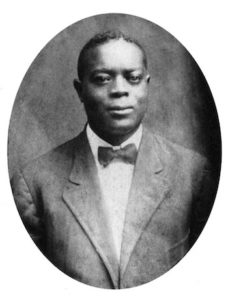
"King" Oliver
King Oliver, a Black musician, was born on this date in 1885.
Joe "King" Oliver was from Donaldsville, LA. He played cornet in the brass and dance bands in New Orleans' red-light district, Storyville. One of the bands he co-led with trombonist Kid Ory was considered New Orleans' hottest and best in the 1910s. Oliver was very popular in New Orleans across economic and racial lines and was in demand for jobs from rough working-class Black dance halls to white society debutante parties.
According to an interview at the Tulane Jazz Archive with Oliver's widow, Stella Oliver, in 1919, a fight broke out at a dance where he was playing, and the police arrested him, his band members, and others. This incident made Oliver decide to leave the Jim Crow South.
By 1922, after travels in California and the Midwest, he was the jazz "King" in Chicago, with King Oliver and his Creole Jazz Band performing at the Royal Gardens (later renamed the Lincoln Gardens). Virtually all the members of this band had notable solo careers. His earliest records were as King Oliver's Creole Jazz Band in 1923, then as King Oliver's Dixie Syncopators (from 1926-'28). Also, as with many other jazz musicians in Chicago, his bands often played in Al Capone's Mafia-run clubs.
He was among the original three great New Orleans "Jazzers," Kid Ory and Jelly Roll Morton. Oliver is given credit for having developed the use of cups, glasses, mutes, and buckets, as well as much of the phraseology that made up the roots of jazz. Louis Armstrong said that Oliver "created some of the most famous phrases you hear today." And Mutt Carey, whose style was heavily influenced by Oliver, said: "He could make his horn sound like a holy roller meeting."
Oliver recorded in New York City for a few years until his popularity waned. Some claim he demanded too much money for his performances, and the work ran out. During the 1930s, his southern tours proved unsuccessful, and he also had to stop playing due to dental problems caused by pyorrhea. His most outstanding disciple, cornet and trumpeter Armstrong, referred to him as "Papa Joe." He died in poverty in Savannah, GA, on April 10, 1938. At the time, he worked as a janitor in a pool hall.
Jazz People
by Harry N. Abrams, Incorporated, New York
Copyright 1976
ISBN 0-8109-1152-3